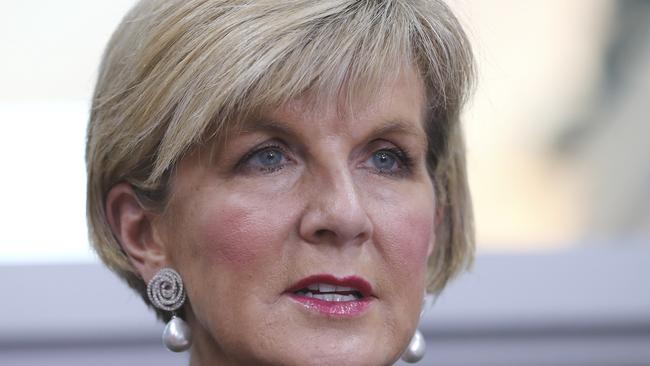Bishop preferred leader as Turnbull loses support
Malcolm Turnbull has lost key Cabinet support as fears grow he’ll allow citizenship to drag the government to an election.

Malcolm Turnbull has lost key support in cabinet as fears grow he will allow the citizenship crisis to drag the government to an election early next year which would wipe out the Coalition.
There is no challenge underway against the Prime Minister but last Monday’s cabinet meeting, during which ministers confronted Mr Turnbull and overturned his plan to have the citizenship details of MPs’ families released, has radically changed attitudes to his leadership.
Senior ministers have lost faith in Mr Turnbull’s judgment over the fallout from the High Court decision on MPs’ eligibility, which has led to two by-elections and speculation a general election for the House of Representatives could be called in February rather than an expected series of by-elections.
The seminal change in ministerial attitudes comes as the latest Newspoll shows Mr Turnbull’s dominance over Bill Shorten as preferred prime minister has ended.
Julie Bishop is well ahead of Mr Turnbull as preferred Liberal leader, and both the deputy Liberal leader and Peter Dutton are ahead of Mr Turnbull among the “lost Liberal legions” who have turned to One Nation since the last election.
While Mr Turnbull’s supporters have blamed Tony Abbott for destabilising the Liberal Party, and there have been calls for his return as leader, the reality of the Liberals’ partyroom, which decides the leadership, is that Mr Abbott does not have the support for a challenge and the top contenders are Ms Bishop and Mr Dutton, as the conservative candidate.
Mr Abbott would likely be included in a cabinet without Mr Turnbull and is considered a chance to be opposition leader again, but is unlikely to have the support to be returned as prime minister.
Today’s Newspoll survey shows Ms Bishop well ahead of Mr Turnbull as preferred Liberal leader, 40 per cent to Mr Turnbull’s 27 per cent, and Mr Dutton on 11 per cent, but the Foreign Minister’s strongest support is among Greens and Labor voters, with Mr Turnbull edging out his deputy among Coalition voters 42 to 39 per cent.
But within the One Nation vote, where the Coalition must recoup votes lost after the last election, Ms Bishop and Mr Dutton outpoll the Prime Minister, with 38 and 24 per cent respectively to his 21 per cent.
With One Nation expected to play a pivotal role following the Queensland election, Coalition MPs recognise they would face a dismal defeat if a federal election were held any time soon.
Until last week, Mr Turnbull has had solid support in cabinet: he’s been able to say he’s more popular than the Labor leader; the Coalition has managed its bare one-seat majority; there has not been a viable contender; and an election has not looked likely until at least the end of next year.
But the leaking of news that Mr Turnbull was rolled in cabinet last week after arguments from Scott Morrison, Peter Dutton and Josh Frydenberg over the citizenship crisis; the loss of all electoral gains this year; Mr Shorten’s best ever performance as preferred prime minister against Mr Turnbull; the loss of majority government; and growing fears Mr Turnbull will allow an early election have changed the leadership equation.
Government leader of the house Christopher Pyne yesterday rejected suggestions there would have to be an early election, declaring the Coalition could go full-term until “July 2019” but conceded the government could lose resolutions on the floor of parliament when it resumes.
“We have the support of Rebekha Sharkie (Nick Xenophon Team) and Cathy McGowan (independent) on matters of confidence and supply. So the government is not about to change,” Mr Pyne said in Adelaide as he tried to reassure voters of government stability. Education Minister Simon Birmingham also conceded the government could lose resolutions but accused Mr Shorten of “playing politics”.
Labor is trying to maximise the sense of crisis by creating Coalition parliamentary losses with the aim of forcing an early election. Any election before next August has to be a House-only election; a half-Senate election cannot be held until after July.







